Text
The Ultimate Principle of Human Life
New Post has been published on https://www.mindcoolness.com/blog/the-ultimate-principle-of-human-life/
The Ultimate Principle of Human Life
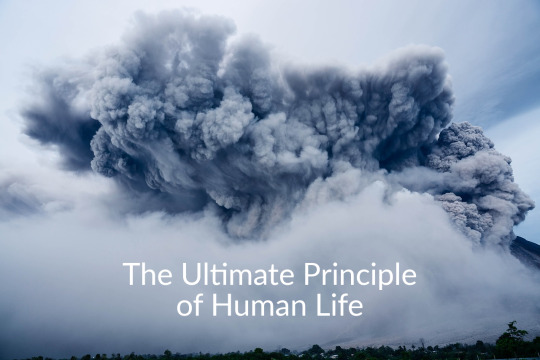
The ultimate principle of human life is to be present in it—to act out of presence. What this means and what the alternative would be is pointed at by the following table:
activepassiveawake, aware, mindfulasleep, unaware, mindlessdoing what you truly wantdoing what you happen to wantdriven by reasondriven by emotionflourishingsufferingagency, autonomyaddiction, compulsiongrounded in personal valuesdirected by social pressurestaking responsibilitybeing a victimfreedombondage
One could also say to be at the cause rather than the effect, but this would require a free will, which we do not have. What we can have, however, is strength of will.
Continue Reading
What It Means to Be Free
How to Live Without Free Will
0 notes
Text
How Do You Use Facts?
New Post has been published on https://www.mindcoolness.com/blog/how-do-you-use-facts/
How Do You Use Facts?
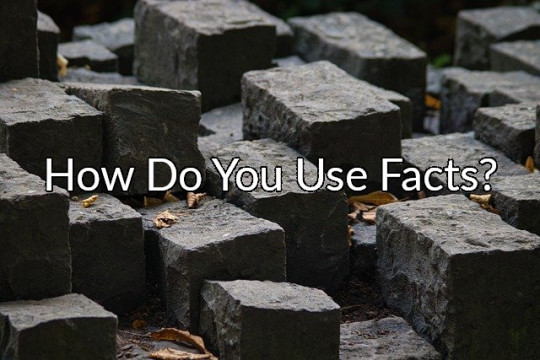
Facts can be useful because the truth helps us to navigate the world better than falsehood, but:
A fact used to argue does not solve a problem.
A fact used to offend does not promote the discussion.
A fact used to be right does not help anybody.
A fact used to distract will not reach intelligent ears.
A fact used to rationalize diminishes one’s character.
A fact used to excuse weakness kills motivation.
Communicating effectively with others and oneself requires more than just speaking the truth.
0 notes
Text
What Is a Strong Will?
New Post has been published on https://www.mindcoolness.com/blog/what-is-a-strong-will/
What Is a Strong Will?
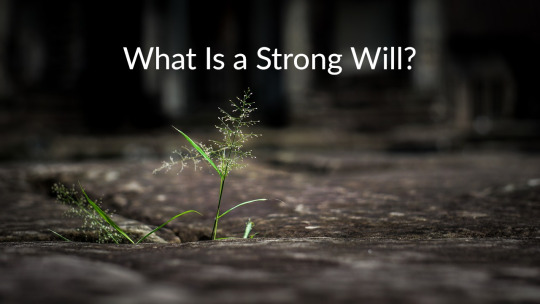
What constitutes a strong will depends on what time frame we consider:
Stubbornness. In the short term, a strong-willed man does everything in his power to win the current fight, even at the cost of losing the battle, let alone the war. This is the person who resists the truth because he can never be wrong, who mistreats and diminishes others in petty displays of power, and who never changes course even when it’s obvious that his plan was stupid.
Goal fixation. In the medium term, a strong-willed man does everything in his power to achieve his goals. This includes the gold medalist who sacrifices his health for glory, the opportunist who corrupts his character for profit or popularity, and the workaholic who neglects his body and family for economic success.
Life maximization. In the long term, a strong-willed man does everything in his power to win at life itself. This is the person who balances all areas of his life with determination after careful consideration, who places growth, awareness, and well-being above his ego’s coping mechanisms, and who compromises neither his values nor his cheerful serenity to fulfill culturally dictated duties while chasing socially glamorized ends, for he understands that dying is the only real duty and death the ultimate end.
We can easily detect stubborn myopia at the point where learning stops and where relationships break or become abusive. But when does high-achieving enthusiasm—one’s will to greatness—deteriorate into goal-fixated fanaticism? This happens when a goal becomes obsessive, when it constrains one’s freedom, when it limits one’s behavioral flexibility such that one pursues the goal not out of a conscious decision, but out of deep-seated insecurities and unreflected desires. Although obsessions may indeed reflect volitional strength, their underlying will is misdirected like that of the anorexic who uses her willpower to develop an eating disorder. Goals are, of course, a great way to help structure one’s life, but they must not be mistaken for life’s substance.
2 notes
·
View notes
Text
The Pleasure of Willpower and the Lie of Delayed Gratification
New Post has been published on https://www.mindcoolness.com/blog/the-pleasure-of-willpower-and-the-lie-of-delayed-gratification/
The Pleasure of Willpower and the Lie of Delayed Gratification
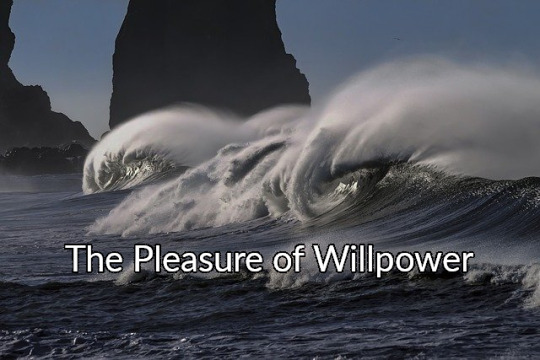
Last week I wrote about radically embracing life in the present moment, which is certainly not the same as living for the moment without regard for long-term consequences.
This might be hard for some to understand, because most people see self-discipline as the eschewal of current pleasures. With willpower, they assume, one sacrifices short-term pleasure for the sake of a bigger pleasure in the future. So they feed their dreams and hopes with the idea of delayed gratification while disregarding the reality of the present moment—often, alas, with meager consistency to little avail.
If we focused instead on our acts of will as they offer themselves at any moment, rather than on our hopes and dreams, we would be more effective and see that current pleasure need not be sacrificed for future pleasure. Exerting willpower immediately puts us in a state of freedom, which is itself a form of pleasure, so that we are not forgoing present pleasure, but substituting it by another type that is much more consistent. And although our power of will must be guided by values and goals, these merely provide structure (a rational direction), not substance (an emotional desire), as hopes and dreams do.
Thus, living in the present moment does not imply a subjugation to short-term pleasure, for it can involve a shift in pleasure that reflects freedom. Still, if we want to know ourselves, all emotions (including pleasures) are beside the point. The highest state of awareness is without judgment.
2 notes
·
View notes
Text
This Is Life, and That's It
New Post has been published on https://www.mindcoolness.com/blog/this-is-life-and-thats-it/
This Is Life, and That's It
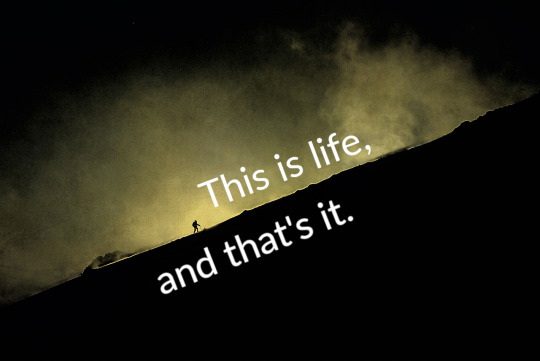
This very moment right here, right now is your life. Look at it. It’s as good as it gets.
There is nothing to wish for, nothing to hope for. Your desires are mere distractions. They distract you from the simple truth that this is reality. Reality won’t get any better. It will either stay reality or be gone. There is no room for hope, no need for hope—for all is well.
But you’re suffering? Well, too bad. Or you’re happy? That’s okay, too. Such emotions are beside the point. The point is that this very moment is your life. It doesn’t get any better than this. This life is you, and you are as good as it gets.
“So can’t I improve, can’t I strive to be better?” You can do what you want, but you are forgetting yourself. What I want is to remind you that this moment is your reality, your life, and that’s it.
This is as good as it gets.
Continue Reading
Beyond Good and Bad?
Plunge Your Mind in Cold Water
1 note
·
View note
Text
What It Means to Be Free
New Post has been published on https://www.mindcoolness.com/blog/what-it-means-to-be-free/
What It Means to Be Free
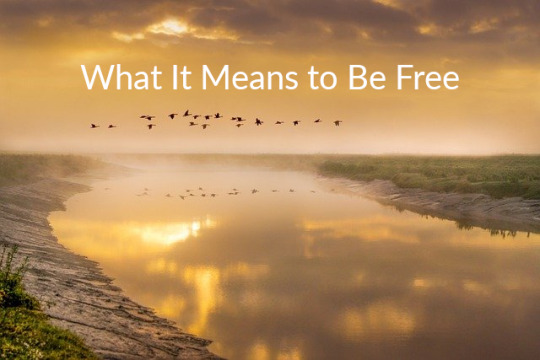
Freedom is the pleasure of doing one’s will. However, since we often understand concepts better by looking at what they are not, let us briefly consider what could limit our behavioral flexibility, that is, what we are free from in a state of freedom:
Free from reaction. The free man does not get triggered to react emotionally (out of fear, rage,….) to a situation; instead, he actively responds based on a conscious decision or acts proactively to begin with.
Free from compulsion. The free man is not obsessed by or addicted to anything, and his habits are not mechanisms to cope with the hardships of life, but to thrive in spite of or because of them.
Free from expectation. The free man never places expected outcomes over the integrity of his will; rather than opportunistically compromising his character under the illusion of knowing what the future will bring, he acts from his center with joyful hopelessness and welcomes whatever will be.
1 note
·
View note
Text
Two Pitfalls of Enlightened Egoism
New Post has been published on https://www.mindcoolness.com/blog/two-pitfalls-of-enlightened-egoism/
Two Pitfalls of Enlightened Egoism
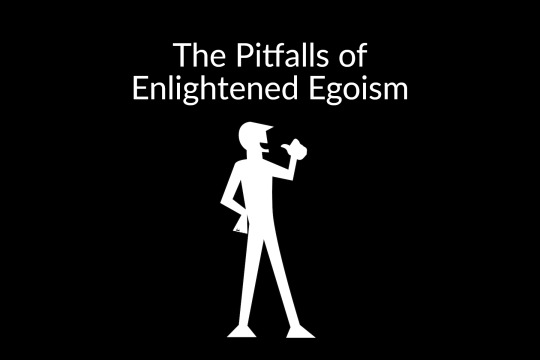
The egoist says, “I do what I want.”
The vile egoist (the asshole) says, “I do what I want—fuck the rest.”
The enlightened egoist (the sage) says, “I do what I want, and that will be good for the rest, too.”
As an asshole, your unbridled freedom may give you a certain appeal and bring you some success, particularly in the short term. But being stuck in a combative win-lose mindset limits your potential, because making other people worse off poisons your relationships, and if you gain pleasure from their loss, you sicken your mind.
As as sage, you think win-win and consider the long-term consequences of your actions: the healthy relationships to be built and the mutual benefits of effective cooperation. Even in the here and now you will profit, namely from the emotional bonus of prosociality, the immediate pleasure of being useful to others.
Alas, there are two serious pitfalls for the enlightened egoist.
First, your attitude of wanting to serve others could stem from an unhealthy need to serve. That’s when “I do what I want, and that will be good for others, too” really means “I do what others want, and I rationalize to myself that this is good for me, too.”1 Such an attitude is not egoism, but servitude, which brings along a loss of respect because it encourages others to take advantage of you.
Second, your aim for cooperation may reveal itself as a conditional good you do only in order to get something back later. If you do something for me just because you expect a favor in return, then you are not really doing what you want; you are doing what (you think) I want and thereby compromising your true will. While you might really want what you expect to get from me (or perhaps money from your employer, affection from your partner, recognition from your peers): if this expectation makes you do something you do not want to do, you are not free.
You can prevent both these types of servitude by knowing what you truly want to do and acting accordingly. What it requires is that you value yourself and that you value doing over getting. Sometimes it may not seem ideal to value what you do over what you get, but if you relentlessly focus on your actions first, you will always get the most important things anyway—to wit, freedom and character.
Continue Reading
Egoism vs. Altruism: A Game-Theoretic Perspective
0 notes
Text
The Two Principal Values: Choose One
New Post has been published on https://www.mindcoolness.com/blog/the-two-principal-values-choose-one/
The Two Principal Values: Choose One
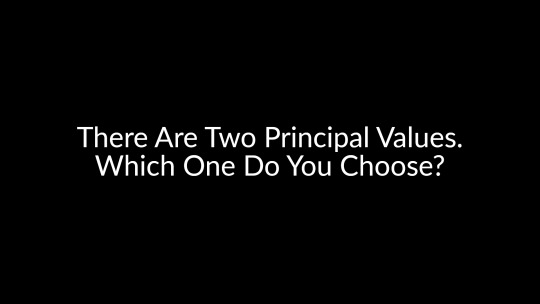
Values are beliefs of the form “X is good,” whereby X is an abstract concept, and you know that X is good through life experience that you have reflected upon or, in brief, through wisdom. Values are distilled wisdom.
But the wisdom need not be your own. You may borrow it from your family, educators, mentors, or some broader social network embedded in your culture. Political ideologies, philosophical schools, and religious traditions are common sources of values, too. In all these cases, you rely on the wisdom of others and adopt an exogenous value system.
This has many advantages. Not only does it make your life a lot easier, it also requires less of you. You don’t have to gather and distill wisdom for yourself, and you can stay humble enough not to deem yourself wiser than everybody else. Moreover, the wisdom of others has usually stood the test of time. A certain set of values might have served your family well for generations, enabled an ideology to dominate your culture, or helped a religion flourish for centuries, even millennia. What are your few decades of life experience compared to that?
But there are also downsides to subjecting yourself to exogenous values. How can you be certain that the values are not outdated in your present-day environment? How do you know that they are actually good for you rather than serving the interests of others? And while you might have been alive to gather wisdom for only a few decades, you can, if you are aware enough, access—through the intelligence of your body—the adaptive wisdom of many millions of years of evolution.
Also, if you decide to individualistically build your own self-determined, custom-tailored system of values, you can still benefit from exogenous values by eclectically picking those that fit best with your current stage in life, although this does raise a difficulty: How do you choose the right ones and prioritize them optimally? By contrast, when adopting an exogenous value system, the selection and prioritization has already been done for you.
Yet even then there remains one decision which nobody can relieve you of: the choice of the principal value, that is, whether you choose the path of collectivism with exogenous values or the path of individualism with endogenous values. So ask yourself: Do you prefer the warm security of belonging to a group and tradition or the cold freedom of going your own way? Do you want to subordinate your will to some higher order that transcends your petty self, or do you want your will to flow unrestrainedly from the depths of your being? The answer will depend on your social nature, your introspective tendencies, and your tolerance for uncertainty.
Certainly, it is an important decision because it will determine most of your other values, and your values will determine what you classify as good and bad in this world, which in turn will influence your thoughts and actions, which finally will bring about experiences that hopefully are on the whole more pleasant than unpleasant—for that is all we can wish for in this life anyway.1
Continue Reading
On the Importance of Values in Life
0 notes
Text
How Psilocybin Disrupts the Brain
New Post has been published on https://www.mindcoolness.com/blog/how-psilocybin-disrupts-the-brain/
How Psilocybin Disrupts the Brain
Several weeks ago, I bought myself I nice little gadget, the Muse S brain sensing headband, which is a consumer-grade EEG device for sleep tracking and neurofeedback during meditation. I use it predominantly for recording my brain waves during unguided meditation so that I can then play around with the resulting EEG data.
Being the somewhat overzealous data scientist that I am, I quickly (and likely prematurely in terms of data volume) jumped into all sorts of statistical tests and time-series analyses, partly reproducing, partly failing to reproduce some well-known scientific findings on the measurement of meditative states with electroencephalography.1 But I won’t bore you with the details here, the more so as I’m the only subject in all my experiments anyway. During anomaly detection, however, I found something so striking and interesting that I just cannot abstain from writing a blog post about it. So let’s get right to it.
In addition to diligently recording the first thirteen minutes of my daily meditation practice, I also tracked several variables such as amount of sleep, physical exercise, eating protocol (currently ketogenic), intermittent fasting, caffeine intake, stress throughout the day, subjective level of distraction during meditation, and a few more. The last of these variable, labeled “comments,” captures extraordinary events. Over the course of 51 recorded days, I logged 7 such events that I thought were likely to influence my meditation session—and I’m happy I did, because they show something amazing.
Here are the most significant outliers I found in the data:
This graph illustrates, for every meditation session (dates on the x axis), the daily variance of absolute delta band power differences in the right hemisphere (y axis, exponentiated by 6 for dramatic effect). And what we can clearly see are four spikes, which all happened on those days where I had munched on some magic mushrooms.
Ok, so what does this mean? First of all, raw EEG signals are usually decomposed into different frequency bands, and the lowest frequencies are called delta waves. These slowest of all brain waves typically emerge during deep, dreamless sleep and correlate with loss of bodily awareness. Second, my EEG device has four active electrodes: one on each side of the forehead (AF7, AF8) for signals from the frontal lobe, the others behind each ear (TP9, TP10) for signals from the temporoparietal junction. Third, we can calculate the absolute power of the delta band for each of these channels by taking the logarithm of the sum of the spectral density of the EEG data over the delta frequency range.
For the graph above, I simply subtracted the delta band power at electrode TP10 from that at electrode AF8 for every second of recording and absolutized the difference before computing the variance of these power differences for each day.2 So what the spikes indicate is that the similarity between the power in the frontal lobe and the power in the temporoparietal junction was highly unstable over the course of the corresponding meditation sessions, at least for delta waves in the right hemisphere. I did not find the same pattern for other frequency bands, nor in the left hemisphere, nor between opposite electrodes across hemispheres.
The following chart provides a clearer picture of what the variability of that difference looks like for a single recording, in particular, for the highest spike in the previous graph. It also shows that the spike is unlikely to represent a mere artifact and that the delta band power is typically higher at TP10 compared to AF8, as indicated by the positive means (dashed horizontal lines).
Maybe you find my difference measure to be somewhat contrived, not well-justified? Good, let’s simplify things! We will, in fact, find something even more intriguing.
For the next diagram, we ditch the channel interaction and inspect the four channels separately. More precisely, we just look at the variance of their delta band powers for every day of recording:
Now we have at least 7 spikes… Wait, haven’t you already read this number a few paragraphs above? Indeed, I mentioned that on 7 out of 51 days I logged an “extraordinary event.” And yes, you’ve guessed it, these events coincide precisely with the graphical spikes:
Now could this be even more interesting? We have a spike on one day where I had a hangover from drinking on the day before (the only day I consumed alcohol during that period3). We have a huge left-frontal spike on the day I jumped out of a flying plane for the first time in my life (and suffered a headache afterwards). And there is, to my great surprise, even a spike on the day I received my second dose of Pfizer-BioNTech’s vaccine against COVID-19 (roughly 17 hours after which I experienced the whole pallet of common side effects).
Again, here’s the power variability in greater detail for selected recordings:
The means of delta band powers don’t differ significantly when comparing ordinary and extraordinary days; their variances, however, likely do.4 So the critical difference seems to lie in the (in)stability of low-frequency brain waves over time. Some drugs and extreme activities appear to destabilize the brain’s delta rhythms, and psilocybin in particular seems to also affect the coordination of that dispersive disruption within the right half of the brain. Yet this blog post is not a scientific paper and my data is just a single-subject snapshot, so I won’t embarrass myself going any deeper into interpretation mode.
Here are just a few hints from related findings, produced by full-fledged scientific studies:
Psilocybin-induced experiences correlate with the lagged phase synchronization of delta oscillations.5
The peak of a DMT experience coincides with the emergence of delta oscillations.6 (I tried to replicate this finding with analyses based on the IRASA algorithm and could generate somewhat comparable results, but far from being as impressive as the plots above.)
One study reported that psilocybin reduces coherence in theta, alpha, and beta bands, but unfortunately I can only access the abstract, which doesn’t mention delta waves.7 (I computed coherence, but did not get convincing results for the delta band.)
Children with severe intellectual disability due to Angelman’s syndrome show more dynamic and diffuse8 delta power in their brains.9
Children suffering from Dravet Syndrome show diffuse delta activity during epileptic seizures.10
Schizophrenia, which we know is mimicked symptomatically by the psychotic effects of psilocybin, is associated with diffuse delta rhythms.11
Finally, I should briefly mention some technical details: I recorded my own brain waves with a 4-channel Muse S headband (affiliate link) and the Mind Monitor app. The sampling frequency was 220 hertz, the notch frequency was 50 hertz, the recording interval was 1 second, the recording time was in evenings between 6 and 10 pm, and the duration per recording was ~13 minutes of meditation practice, of which 600 seconds were extracted using the interval [-630:-30] in order to prevent start and end artifacts from tainting the analysis. During signal pre-processing, artifacts like eye blinks and jaw clenches were removed, together with 47 seconds of poor connection quality, resulting in a total of 31612 time points used for analysis.
0 notes
Text
The Detriment of Self-Knowledge
New Post has been published on https://www.mindcoolness.com/blog/the-detriment-of-self-knowledge/
The Detriment of Self-Knowledge
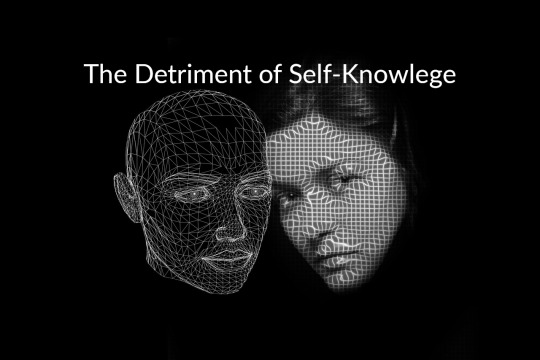
Imagine you have a few pieces of wood and you want to build a chair. Once you have a plan of how to construct the chair, you must gather certain truths about your pieces of wood. So, for example, you measure their sizes. This gives you quantitative facts that will be useful for cutting the pieces properly. Once you’ve built the chair, and it doesn’t wobble, you have no more use for these facts. You can and likely will forget them.
This is how we should handle the truth in general: gather facts for a specific purpose, and forget them when they are no longer useful. We do this automatically with most truths we come across in our lives, sometimes even forgetting them too soon (your school days send their regards). But there is one critical exception, namely, truths about ourselves.
Consider some truths about your body. As a little boy, it was useful to know your height when you needed to qualify for a swell roller coaster ride. As an adolescent, it was useful to know the size of your penis when you needed to buy your first pack of condoms. Lying about these sizes would have been bad for your safety, so the truth was preferable to delusion. Beyond such special occasions, however, there’s little to no use in thinking about these facts, no matter how truthful they are. Still, many young men keep thinking about these sizes, comparing themselves to others, and developing insecurities.
For another example, when you’re deciding on a career path or a city to move to, it will be useful to know certain truths about your physical and cognitive abilities, your personality and social tendencies, and your morality and value hierarchy. You don’t want to become a carpenter when you’ve got two left hands, sell insurances when you’re an introvert, or live in a Christian town when you’re a satanist. So there definitely are times when self-knowledge is good, when being aware of objective facts about yourself is useful.
Yet often after we’ve learned such facts, we don’t just use them to make a rational decision and then move on. Instead, we start to obsess about them, use them for endless rumination, and—after lavish self-judgment—become identified with them, building our egos around them.
Let’s say you have three specific numbers in your head, each on a scale from 1 to 10, about how beautiful, intelligent, and extroverted you are, and let’s assume they are accurate truths in spite of their one-dimensional, static simplicity. What’s the use of these numbers, these quantitative facts? If you compulsively rehearse them in your mind, they can only be detrimental, because they will distract you from the specific problem you’re trying to solve or from simply being present in the moment.
Even more, self-knowledge that induces frequent self-judgment becomes self-fulfilling and self-reinforcing over time. Then what started out as a casual fact about a little snapshot of your self turns into an integral part of your self-image. You become trapped in your own beliefs.
We are taught that knowledge is power, that knowledge is good. But knowledge is good only to the extent that it is useful. If you want to build a chair and you’re incessantly thinking about how the sky is blue, who’s the president of Austria, and E=mc², then you’ll probably build a shitty chair.
In most cases, however, our knowledge of external facts is much less intrusive on our minds than self-knowledge. We can usually store our knowledge away in a metaphorical box, close the lid on it, and not have it infiltrate our minds when we don’t need it. As a consequence, it’s not usual for us, when having fun at a social gathering, to all of a sudden obsess about Ohm’s law and electrical conductance, a fact we learned about in middle school many years ago.
This is in stark contrast to self-knowledge. Here most people are incapable of closing the lid, so their self-related facts come out of the box to occupy their thoughts even when they don’t need them. Then they start to fret, worry, and ruminate. (The reason, of course, is not the self-referentiality per se, but the emotional involvement; we see something similar happening with facts about justice and politics, which some people cannot shut up about.)
So what we must learn to do is not to “think more positively” or, in the extreme, to delude ourselves, but to treat our inner knowledge in the same way as we treat our outer knowledge: to use it when needed and to not think about it otherwise.
Knowledge is better than ignorance, truth is better than delusion and deceit. But knowing the truth is not enough. We must also know when to use it and how to not think about it when there’s no use for it. This is wisdom.
Continue Reading
Who Are You?
Why Positive Thinking Is Bullshit
Why Personality Tests Do Not Enhance Self-Knowledge
1 note
·
View note
Text
What Is Reality? Science Vs. Spirituality
New Post has been published on https://www.mindcoolness.com/blog/what-is-reality-science-vs-spirituality/
What Is Reality? Science Vs. Spirituality
For a useful working concept, we can define reality as that which is qualitatively experienced by an aware mind and quantitatively modeled by science. Accordingly, we can describe reality as a spectrum that spans in two directions: one way into the more abstract, quantitative, and objective; the other way into the more concrete, qualitative, and subjective.
At the one extreme, we have pure mathematics and a conceptualization of the world as a mathematical object—perhaps an intricate quantum graph or some other structure that I really have no business talking about, given my limited knowledge in this area. At the other extreme, we have pure awareness and the world as a manifestation of consciousness; there we are in the realm of spirituality.
In between, we have all the different sciences with varying degrees of hardness. For example, as the principal hard science, we have physics—very close to mathematics—and something like neuroscience a bit more to the right. On the other side of the spectrum, we have, among many others, psychology, followed by phenomenology and suchlike, which are increasingly focused on subjectivity and qualitativeness. Somewhere in the middle and leaning partly to the left, partly to the right, I would locate my own academic background: the field of cognitive science.
For practical purposes, the left side is more useful for outer engineering (building things), while the right side is more useful for inner engineering (developing oneself).
But remember that all these fields and sciences are just language games we humans like to play. Towards the left, we play them at lower levels of descriptions of “the Universe” or even “the mathematical universe,” according to a hypothesis of the same name proposed by Max Tegmark. Towards the right, we move to higher and higher levels until we climax conceptually, mystically with the word “God.” Actually, though, our natural languages collapse at the endpoints: either into pure formalisms or into a Zen-like rejection of words and concepts altogether.
Now, when we look past the differences, we see that, ultimately, all these language games are essentially describing one and the same thing. “God,” “the Universe,”… these are different words for different perspectives, yet unanimously pointing at that which we could just as well call “nature,” “existence,” “the world,” or—to come full circle—”reality.” In the end, the words don’t matter; what matters is what we do with them.
Continue Reading
What Do Science and Spirituality Have in Common?
Extending the Map Metaphor of Truth
My View on God
0 notes
Text
How Are Individuality and Creativity Possible?
New Post has been published on https://www.mindcoolness.com/blog/how-are-individuality-and-creativity-possible/
How Are Individuality and Creativity Possible?
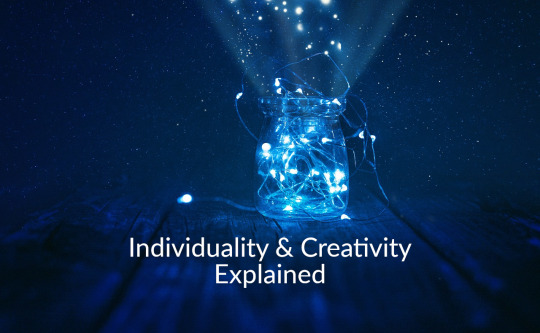
If your will—what you want—is determined by what you have learned through your environmental, parental, and sociocultural conditioning in conjunction with mimetic processes, then how is individuality possible?
For one thing, all the learned contents, coming from an innumerable amount of different sources, are intermingled in a way that is perfectly unique to you: it is your personal learning history, which, in addition, is not linearly imposed onto you, but dynamically shaped by how you react to certain types of conditioning. For another thing, this potpourri of influences on your will is integrated within your brain in deep interaction with your genetic code, which is also unique to you (unless you are a monozygotic twin). Thus, the end product that you experience as your will is individualistic in the sense that nobody else on this planet has the exact same will as you.
We can also draw a parallel here to the question of creativity: If your mind—what you think—is determined by what you have learned though all the sensory information that has ever left a mark on your central nervous system, then how is creativity possible?
Again, the answer lies in the way the incoming information is idiosyncratically mixed and integrated in your very own head. However, if your creative outputs are too closely related to a discernible counterpart already existing in the world (for example, if your artistic style is just a cheap copy of well-known legend), they you won’t be seen as creative, but discounted as unoriginal.
This is not to say that in order to be original you would have to be a principal point of origin (perhaps a receiver of divine inspiration), which is a metaphysical misconception, but that the origin of your thoughts be indirect, varied, muddled, and irreducible enough so as to count as creative.
The same holds true for your individual will: A direct line that can be drawn from your action to an obvious external trigger (for example, you got brainwashed, peer-pressured, or seduced into doing something) provides a clear, reducible explanation for why your will does not count as individualistic. By contrast, if no one can find any direct causal connection to any specific conditioning event, then your actions will exude the scent of individualism. Still, your individuality goes no deeper than that: its essence is nothing esoteric, but the mere limitation of human’s ability to detect nexuses.
To conclude, there is no such thing as pure individuality or pure creativity, because both are deeply rooted in the impressions produced by your environment and community (in the broadest sense of the word). But the more extensive and complex those roots are, that is, the more obscure and indirect the links between your learning inputs and behavior outputs, the more individualistic and creative you may feel about your will and mind, respectively. Certainly, this is how you can expect to be judged by others.
Read More
Why You Don’t Have Your Own Will
Why Do You Want What You Want?
0 notes
Text
Why You Don't Have Your Own Will
New Post has been published on https://www.mindcoolness.com/blog/why-you-dont-have-your-own-will/
Why You Don't Have Your Own Will
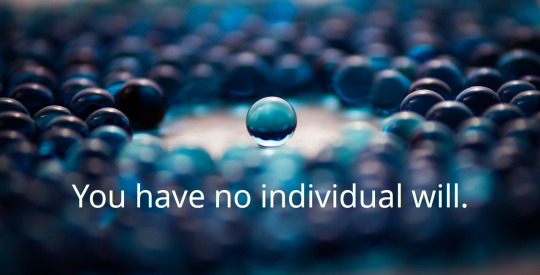
You don’t have your own will, and neither do I. Nobody has an individual will.
In most posts on this blog I have assumed the opposite: that you must look within yourself in order to find out what you truly want—to find your True Will. I have now come to realize that I was constructing a mirage.
In reality, your will is not some mystical individualistic force within you that demands excavation by digging into the depths of your “self.” Rather, it is the dynamic result of everything you have learned in your life about what is useful and desirable. You have learned this from your parents, through ongoing social and cultural conditioning, and from all the role models you organically tended and still tend to emulate, among whom are likely many podcasters and YouTubers you have never met in person.
Even if everything you would do is read books all day and not consume any other information, nor socialize with any people, you would still be modeling your will after other people, namely, after these books’ authors, and not to forget the implicit cultural conditioning given by the books’ pre-selection: after all, your are distinctly influenced by the facts that you can read these specific books, which you have selected to read among all the others, and that they exist for you to read in the first place, which for older books means that they have “stood the test of time” within your culture, the very culture that still produces copies of and actively promotes these books.
So whatever you want, whatever you desire, your will is always determined not by the power of your rational mind, but by the history of your sociocultural learning. In the sense that this history is your unique and personal history, built from the idiosyncratic intersection of environmental, parental, social, and cultural influences on your brain throughout your life, and only in this sense, can you still speak of your “individual” will.
Importantly, however, it is not your rationality or any of your conscious thoughts that makes you want something, but it is the whole “you”—the entirety of your ontogenesis.
Practically, this means that whenever you find yourself unsure about what you want, doubtful about where you want to go in life, the solution is not an introspective seclusion where you force yourself to think about it; this won’t help. Instead, it is more helpful to foster your awareness of the factors that influence your will and to perhaps nudge yourself in a direction where their combined message is less contradictory.
For example, if you have a close friend who’s all about making money, a father who tells you to do something reputable, and a mentor who inspires you to overcome your worldly desires, then it’s no wonder that you’re confused about what you want. Not that such confusion is necessarily bad, but if you want more clarity, the best way to achieve it is by limiting the sources of your confusion, that is, by adjusting the amounts of time you spend with people who have conflicting values and by filtering the information you consume on a regular basis in such a way that their combined influences on your will become more internally consistent.
In short, not more thoughts, more reflection, more mental chatter, but less inputs will help you straighten your will.
0 notes
Text
Why Do You Want What You Want?
New Post has been published on https://www.mindcoolness.com/blog/why-do-you-want-what-you-want/
Why Do You Want What You Want?
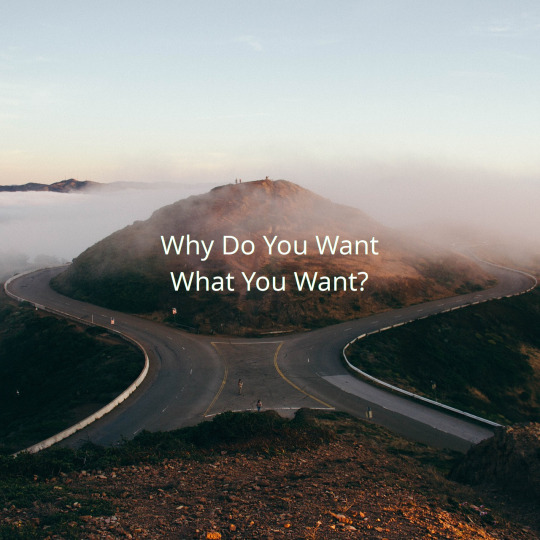
In order to do what you want, you must know what you want and, ideally, why you want it.
The most common reason why we want something is because others want it (this is called the mimetic theory of desire). We want a high-quality partner, successful children, a nice home, an expensive car, a purpose in life, financial freedom, and so forth—because that’s what everybody else wants. Our desires are imitations of the desires of others.
Differences in desires between people typically stem from the differences in the models they mimic: some people want a muscular body with a low body fat percentage because that’s what other people in their social group or their role models on social media desire; other people seek spiritual enlightenment because that’s the in-thing among their peers or because they follow some guru, imitating the common desire of all his other followers.
The other reason why we want something is because we think that it is good for us. Although this should, to the extent that our thinking is knowing, lead to more rational grounds for our conscious desires, it is usually much harder to find out what is truly good, compared to simply imitating a role model or letting society determine our desires. Especially major life decisions such as “Do I want to have children?” or “Do I want to start a business or rather get a degree first?” can be very difficult to answer rationally, but they become easy when we mimic the desires of those around us.
Here are my personal guidelines for navigating these issues:
Be aware of why you want what you want; otherwise, you might make bad decisions.
Try to figure out what is good for you so that your will becomes less determined by what other people want.
If you cannot figure out what is good for you, make sure you select wisely the models you imitate and the social environments you put yourself in, as they will then condition your desires and determine your will.
Further Reading
What Do You Want? On Will and Desire
0 notes
Text
Extending the Map Metaphor of Truth
New Post has been published on https://www.mindcoolness.com/blog/extending-the-map-metaphor-of-truth/
Extending the Map Metaphor of Truth
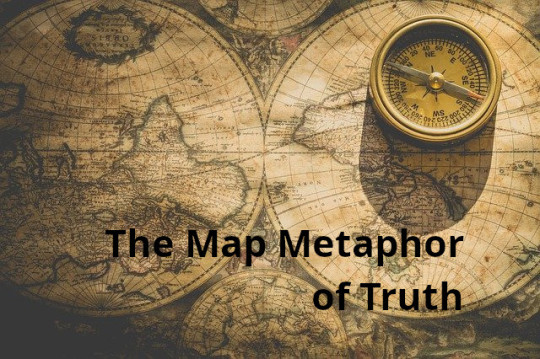
A map is not the territory it represents, but, if correct, it has a similar structure to the territory, which accounts for its usefulness. — Alfred Korzybski, Science and Sanity, p. 58
Truth is a useful map of reality, but truth is not reality, just like a map is not the territory. For example, “This is an oak tree” is a string of letters or perhaps a sequence of sounds, but nothing in the ink or bits of the written words and nothing in the vibrations of the spoken phonemes resembles the presence, the colors, the smells, and the majesty of an actual oak. We may use more or more expressive words to describe the oak in greater detail, but with language we will never express the oak itself, not to mention that the concept oak tree is itself a human-made category and thus part of a map to begin with. Similarly, we may draw more or finer lines on a map, but the lines will only ever abstractly visually represent the roads and paths, the rivers and streams, never concretely present their reality.1
Maps or models can be created in different languages (natural or technical) and at different levels of description (e.g., pedagogic, cultural, high-level scientific, or low-level scientific).
Scientists are the most reliable mapmakers, and their most detailed maps are low-level2 and math-heavy.
Spiritualists are the least reliable mapmakers, creating maps based on sheer fantasy.
Philosophers compare maps and think about mapping functions.
Wisdom means to know which map to pick in a given situation.
Common sense means that you don’t just follow the map blindly: if it sends you down a road that doesn’t exist, you don’t pretend it does.
Morality is a navigation system that tells you which roads to take, but doesn’t allow you to set the destination for yourself.
Religion is a navigation system that has its route preset by tradition and comes with an outdated map.
Mystics are those who take a permanent marker and scribble on the map until everything is plain-colored.
Zen is the teaching that you should get rid of your maps and look at the road.
Read More
What Is Truth?
Technical Vs. Sentimental Language
0 notes
Text
How to Live Without Free Will
New Post has been published on https://www.mindcoolness.com/blog/how-to-live-without-free-will/
How to Live Without Free Will
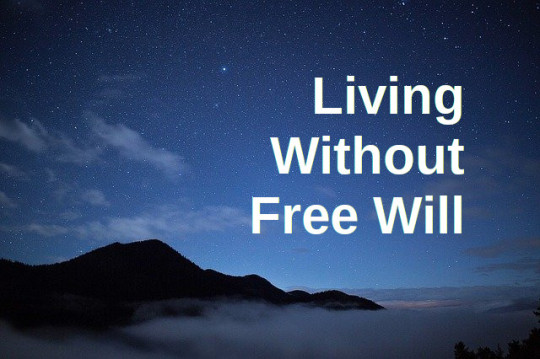
Originally, I wanted this article to be titled Answers to Stupid Questions #2: Do We Have Free Will?, but in contrast to the truly nonsensical concept called ‘meaning of life’ (Stupid Questions #1), the freedom of will cannot be dismissed a priori.
Sure, if we understand ‘free will’ to mean I could have acted differently had I wanted to act differently, then we can reject it as a mere semantic confusion, because in this case the meaning of ‘free will’ coincides with that of ‘will’. However, if what we mean by ‘free will’ is I could have acted differently because I could have chosen how I wanted to act differently, then we have at least some form of freedom allegedly determining our will.
But what does it mean to choose one’s will? Is my power to choose not my will itself? We could perhaps postulate the mind as an entity that is separated from our volition and capable of controlling our will. This would, however, open two further questions: First, do mental processes factually have the causal power to determine volitional processes? And second, who or what controls the mind, controls the genesis of intentional thoughts presumed to steer our will?
We know from neuroscientific research that our conscious thoughts do not have the causal power1 to determine our will, and our personal experience teaches us that we have no control over the thoughts that arise in our mind.2 So the question “How to live without free will” answers itself trivially: as we have always lived, for there is no other way.
Nonetheless, I want to mention three ways in which our awareness of the determinateness of human will can positively affect your mindset:
In your relations with other people, it makes it easier for you to decide when and when not to take something personally, because no matter how badly someone might behave towards you, his behavior is ultimately always a mere result of perfectly natural processes, of nature expressing itself, rather than ill intentions. (It may be useful to know when someone has bad intentions, but there is no reason to fret about it.)
In stressful situations, being aware that your will isn’t free can mitigate your tendency to double your stress by adding mental stressors like negative thoughts on top of the emotions you’re already experiencing. (Of course, you can’t choose not to have negative thoughts, but they will automatically emerge less often from a more resilient mindset.)
In situations that demand self-discipline, knowing that you have no free will helps you to realize that the only way you can affect your behavior is through slow and steady self-conditioning with an incessant focus on your goals and your vision of your ideal self. After all, willpower is not some magical ability you can switch on when you need it, but a muscle that requires consistent training. (Naturally, we don’t have the free will to choose such training, and if we had, we wouldn’t need it, but even just reading about the importance of willpower can help to strengthen it by brainwashing yourself and by linking the practice of doing what’s hard with motivating emotions.)
0 notes
Text
Should You Never Take Things Personally?
New Post has been published on https://www.mindcoolness.com/blog/should-you-never-take-things-personally/
Should You Never Take Things Personally?
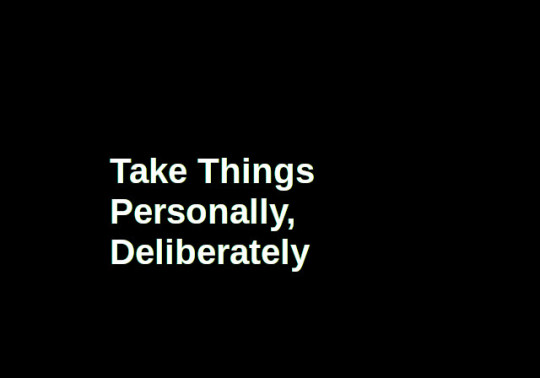
When someone behaves negatively towards you, there are three ways in which you can take it:
Insecurity. You take it personally by default, even when you aren’t attacked on a personal level. This is due to your lack of self-esteem, typically accompanied by an oversensitivity to nonverbal cues. For all you know, the other person might just be in a bad mood because he is sleep-deprived, sex-deprived, angry at or disappointed by someone else, or suffering from suppressed pain—but since you don’t know, you become insecure.
Serenity. You don’t take it personally because you understand that people behave not as a result of conscious intent and free will, but as a result of unconscious processes. This is a healthy response if you haven’t done anything wrong; but have you?
Responsibility. You consider whether you could in any way have affected the etiology of his behavior and thus take it personally to an appropriate degree. You realize that your actions and your current state can affect other people’s states in the short term and that your own character as well as how you actively condition other’s behavior affects how they act towards you in the long term. So you don’t take everything with total serenity because this would rob you of the motivation to learn to communicate more constructively, to lead and influence people more effectively, and to change yourself if advisable.
0 notes